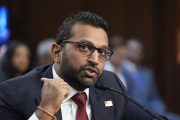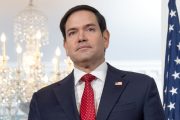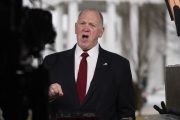
The President said that “we’re representing the people of the United States and when we travel to another county I expect us to observe the highest standards. Obviously what’s been reported doesn’t match up with those standards.” However, he tempered his criticism with the observation that the Secret Service agents “perform extraordinary service on a day-to-day basis protecting me, my family, U.S. officials. They do very hard work under stressful circumstances and almost invariably do an outstanding job. So I’m very grateful.”
According to the Associated Press, 11 agents on duty in Colombia were placed on leave in the wake of the scandal, and at least five U.S. military personnel assigned to the Secret Service for the event were confined to their quarters under allegations that they had been involved in the misconduct as well. “Put together, the allegations were an embarrassment for an American president on foreign soil and threatened to upend White House efforts to keep his trip focused squarely on boosting economic ties with fast-growing Latin America,” reported the AP. Obama met with approximately 30 leaders from the region April 14-15. The Secret Service sent personnel to replace the agents under investigation, and insisted that the President’s security was not compromised by the incident.
Employees at the five-star Hotel Caribe (pictured above) in Cartagena said that the agents in question arrived at the resort a week before the April 13 incident, and drank heavily during their stay. U.S. Representative Peter King (R-N.Y.), chairman of the House Homeland Security Committee, said he had been briefed on the incident and was told that 11 agents had brought women, “presumed to be prostitutes,” back to their hotel rooms, which were separate from where Obama was scheduled to stay.
“King said he was told that anyone visiting the hotel overnight was required to leave identification at the front desk and leave the hotel by 7 a.m.” reported the AP. “When a woman failed to do so, it raised questions among hotel staff and police, who investigated. They found the woman with the agent in the hotel room and a dispute arose over whether the agent should have paid her. King said he was told that the agent did eventually pay the woman.”
Rep King said that “whatever they do in their personal lives should not be done in Colombia, and should not be done when they’re getting ready for the President of the United States to come in. Their job is to protect the President.”
The 11 Secret Service personnel were Uniformed Division Officers, said Secret Service Assistant Director Paul Morrissey, and none was assigned directly to President Obama. He added that all were sent home and replaced, “given the nature of the allegations,” as well as the agency’s “zero tolerance policy on personal conduct.”
Morrissey insisted that the incident “is not reflective of the behavior of our personnel as they travel every day throughout the country and the world performing their duties in a dedicated, professional manner. We regret any distraction from the Summit of the Americas this situation has caused.”
As for the five military personnel being investigated, General Douglas Fraser of the U.S. Southern Command said he was “disappointed by the entire incident” and that the behavior of those involved was “not in keeping with the professional standards expected of members of the United States military.” Colonel Scott Malcom, chief of public affairs for Southern Command, later clarified that “the only misconduct I can confirm is that they were violating the curfew established.”
Ronald Kessler, a former Washington Post reporter and author of In the President’s Secret Service: Behind the Scenes with Agents in the Line of Fire and the Presidents They Protect, said that the incident is “clearly the biggest scandal in Secret Service history,” and suggested that it could end the careers of the agents involved. “The fact that they were engaged in this conduct, you know, compromises the agents,” said Kessler. “The prostitutes could have blackmailed them, could have been involved with terrorists, drug cartel people, or foreign intelligence services. Any foreign intelligence service would love to get a Secret Service agent in their pocket.”
But agency spokesman Ed Donovan disputed Kessler’s charge that the incident reflects slipping standards in the Secret Service. “We have hundreds of personnel that travel around the world every day that conduct thousands of security advances, thousands of events,” he said, “and we don’t have incidents like this that occur. It’s an anomaly.”
Both King and Representative Darrell Issa (R-Calif.), chairman of the House Oversight and Government Reform Committee, said the incident warranted a congressional investigation. “First of all, to be getting involved with prostitutes in a foreign country can leave yourself vulnerable to blackmail and threats,” King said. “To be bringing prostitutes or almost anyone into a security zone when you’re supposed to protect the president is totally wrong.”
Issa told CBS’ Face the Nation that “this kind of a breach is a breach in the federal workforce’s most elite protective unit, and they don’t just protect the President, of course — they protect the Cabinet members, the Vice President, the first family, candidates. So when you look at this, you realize if you can have this kind of breakdown, one that could lead to blackmail … we’ve got to ask, where are the systems in place to prevent this in the future?”




